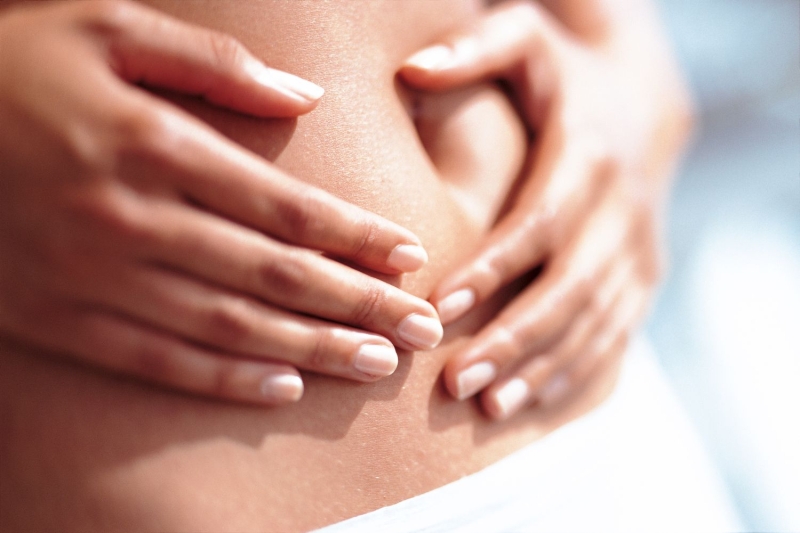Contents
If you've ever experienced that tight, full feeling in your stomach that makes you feel uncomfortable, chances are high that you're dealing with bloating. But what exactly is bloating, and, more importantly, how do you get rid of it?
"Bloating has to do with the amount and type of gas present in your gut," says Dr. Georgia Close, MD. "Most of our gases are either methane, nitrogen, carbon, hydrogen, or oxygen, and your individual subtype of gases can contribute to bloating, as well as the amount of gas in the GI tract, the water content of the gut, and the luminal contents (meaning what's in the inside of your gut, like a lot of fluid)."
Bloating happens to everyone and is very natural. But while there are easy ways to manage it, there are also times when it needs to be addressed for the sake of your overall health. Below, Dr. Close and Mitchell Kang, DO, break down everything you need to know about how to get rid of bloating.
Meet the expert
- Mitchell Kang, DO, is a Virginia-based gastroenterologist at Kaiser Permanente. Georgia Close, MD, is a board-certified gastroenterologist and Hilma scientific advisor.
Causes of Bloating
Bloating can occur for a number of reasons. Dr. Kang says that dietary concerns such as lactose or fructose intolerance and excessive alcohol intake are common causes of bloating. You should also expect to bloat if you suffer from celiac disease, pancreatic insufficiency, irritable bowel syndrome (IBS), constipation, and gut movement issues or have certain cancers, such as colon or ovarian cancer.
Hormonal changes, especially menstrual periods, can also cause bloating for some. Dr. Close explains that you can experience bloating before and during your period as you can feel constipated, and the changes in estrogen and progesterone can lead to diuresis and diarrhea. She adds that eating carbohydrates like fruit, bread, and pasta can increase gas and result in bloating.
Symptoms of Bloating
If you feel pressure or that gas is trapped in your abdomen, chances are you're experiencing bloating. This feeling also ranges in discomfort level. "Your abdomen may feel more full, tight, or more uncomfortable than usual," says Dr. Kang. "It can range from mildly uncomfortable to severely painful."
Dr. Close adds that bloating is subjective and looks different for everyone. "To some patients, it can mean belching and burping. To others, distention and abdominal pain/discomfort. Others define it as flatulence. So first we try to zero in on what the patient actually means by 'bloating,'" she says.

Negative Side Effects
Chronic bloating can lead to a number of health concerns if it goes unchecked. Dr. Close explains that bad bacteria are a huge component of bloating and that someone who has bloating will most likely have other gastrointestinal issues like constipation and diarrhea.
Dr. Kang says undiagnosed celiac disease can lead to lymphoma, a vitamin D deficiency, anemia, osteoporosis, and infertility. Pancreatic insufficiency can lead to malabsorption, muscle wasting, and weight loss. Additionally, untreated H. Pylori infection can result in ulcers and inflammation of the stomach and small bowel, and — worst case scenario — stomach cancer.

How to Get Rid of Bloating
Dr. Close says there are some general things you can do to at least mitigate bloating. She says exercise and movement will help you digest food better and bring relief. You can also try to reduce stress; she explains that a stressed brain releases high cortisone levels, which can bind the chemicals in the colon and small intestine and cause gut problems.
But the best way to treat bloating is to find out what is causing it in the first place. Dr. Kang says that treatment can vary. If your bloating is caused by dietary restrictions such as being lactose-intolerant, you'll want to find diary alternatives. If your bloating is caused by IBS and constipation, you'll want to try low-FODMAP foods along with some medication to treat constipation.
It's best to consult a doctor for any questions you have for the best game plan.
When to See a Doctor
You should always seek a licensed medical professional with anything health-related, but there are times when bloating requires professional help immediately. Dr. Kang says to keep an eye on your symptoms. If your bloating gets progressively worse and lasts for more than a week, it might be time to see a doctor. Other concerning symptoms include fever, nausea, vomiting, unintentional weight loss, blood in your stool, and sleep interruptions. Dr. Close adds that if you are newly anemic and/or are a woman over 40 with sudden bloating, you should consult a doctor immediately.
